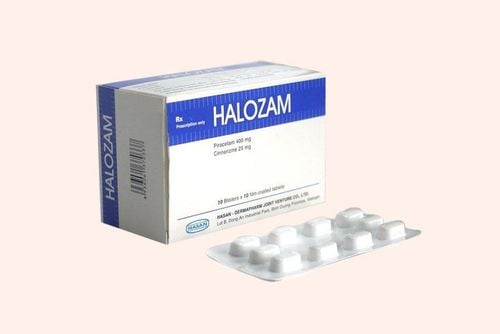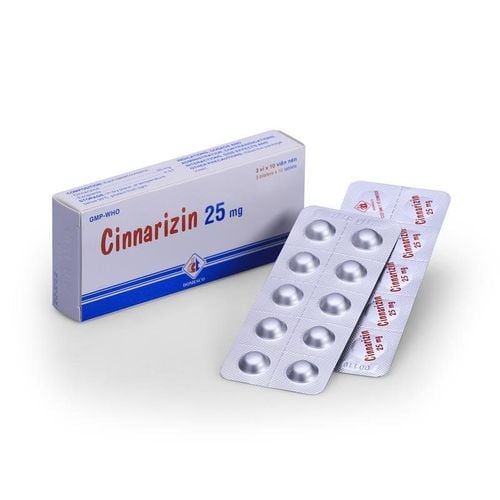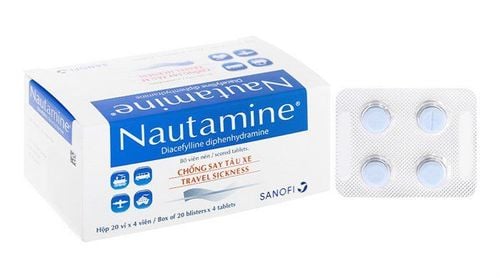This is an automatically translated article.
Dramamine, also known as Dimenhydrinate, is a drug used to prevent nausea, vomiting, and dizziness caused by motion sickness. The drug is used for people 2 years of age and older. The drug is available by prescription or over-the-counter at pharmacies nationwide.1. What is Dramamine?
Dramamine is an antihistamine used to prevent nausea, vomiting and dizziness caused by motion sickness.Dramamine has the active ingredient dramamine and the excipients are inactive but still have the ability to cause reactions, the drug is prepared in many different forms such as:
Tablets Chewable tablets Injection solution Mixed liquid powder form
2. How to use the drug
Dramamine has many forms, so the tolerability is also different.
Tablet form: Take orally, with or without food.
Liquid: It is necessary to measure with a graduated cup to avoid excess volume.
Chewable tablet form: Need to be chewed thoroughly before swallowing.
Dosage of anti-motion sickness drugs also depends on the user's age and physical condition.
Adults Injection solution: 50 – 100mg/ 4 hours intramuscularly (IM) or intravenously (IV). The maximum dose in 1 day is about 400mg.
Oral form: 50-100mg every 4-6 hours. The maximum dose used in 1 day is about 400mg.
To prolong the effect of the drug, the dose can be increased by about 100mg every 8-12 hours. The maximum dose in 24 hours is about 300mg.
Rectal form: You use about 50-100mg over a period of 6-8 hours.
Children Injection solution: Contraindicated for infants. For infants about 1.25mg/kg or 37.5mg/m2 intramuscularly, 4 times a day. Each dose is about 300mg/24h.
Oral form: Use for children 2 years and older.
Children 2 - 5 years old: 12.5 - 25mg/6 - 8 hours. The dose for 24 hours is 75mg. Children 6 - 11 years old: 25 - 50mg / 6 -8 hours. The maximum dose in 24 hours is 150mg. Children 12 years and older: 50-100mg every 4-6 hours. The maximum dose in 24 hours is 400mg

Cha mẹ cần cho trẻ uống thuốc Dramaminetheo hướng dẫn cụ thể của bác sĩ
Do not use for children under 2 years old. Children from 2 to 5 years old: 12.5 - 25mg and used only once as prescribed by the doctor. Children 6-7 years old: 12.5-25mg/ 8-12 hours. Children from 8 to 11 years old: 25 - 50mg/ 8 - 12 hours. Children 12 years and older: 50mg of the drug over 8-12 hours. To prevent motion sickness, take your first dose 30 to 60 minutes before starting an activity like traveling. The effect of the drug is achieved about 15-30 minutes and lasts for the next 3-6 hours after taking the drug.
3. Side effects
Central nervous system: Dizziness, headache, drowsiness, general weakness, fatigue, impaired concentration, anxiety, nervousness, insomnia; rarely - impaired night and color vision, disruption of accommodation. Gastrointestinal: Constipation, dry mouth, decreased appetite, nausea, vomiting. To relieve dry mouth, suck on hard candy (sugar-free) or chew gum (sugar-free), and drink water instead of saliva. Respiratory: Dry mucous membranes of the nose - mouth - throat, bronchial secretions. Cardiovascular: Decreased blood pressure, tachycardia. Allergic reactions: Skin rash, angioedema, bronchospasm, drug-induced dermatitis. Some other side effects may occur: Hemolytic anemia, difficulty urinating. If any of these side effects persist or get worse, stop using the medicine and tell your doctor or pharmacist right away.
4. Indications, contraindications
Indications:
Motion sickness, seasickness. Prevention and treatment of nausea and vestibular disorders due to various causes (except for cancer chemotherapy). Menière's disease (a condition that combines symptoms of dizziness, hearing loss and tinnitus. Contraindications:
Children under 2 years of age and pregnant and lactating women. People with hypersensitivity to dramamine or Inactive ingredients People with epilepsy, acute exudative dermatosis and vesicles (vesicles).

Phụ nữ mang thai không nên sử dụng thuốc Dramamine
5. Some notes when using drugs
Know some of the side effects of the drug, before using it we need:
Tell your doctor or pharmacist if you are allergic to diphenhydramine or if you have any other allergies Tell your doctor your doctor or pharmacist your medical history, especially of: breathing problems (such as asthma, emphysema), eye disease (glaucoma), heart problems, high blood pressure , liver disease , epilepsy, stomach or intestinal problems (such as ulcers, blockages), overactive thyroid (hyperthyroidism), difficulty urinating due to an enlarged prostate gland. Avoid alcoholic beverages as they can distract you. Liquid products or chewable tablets may contain sugar and/or aspartame. Caution should be exercised if you have diabetes, phenylketonuria (PKU), or any other condition that requires you to limit and avoid these substances in your diet.
Please dial HOTLINE for more information or register for an appointment HERE. Download MyVinmec app to make appointments faster and to manage your bookings easily.
Reference source: webmd.com












